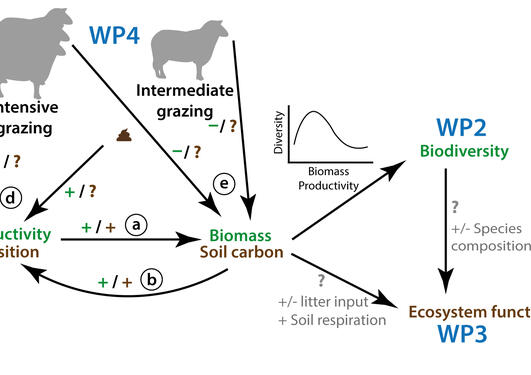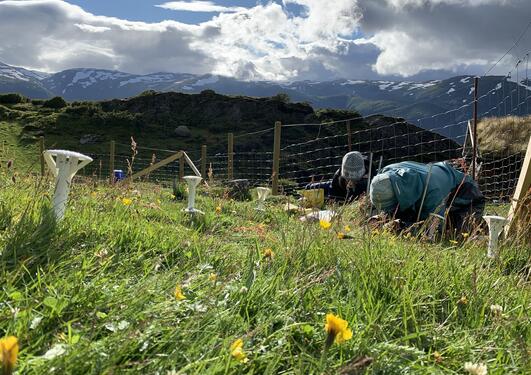Seedlings in alpine grasslands
Aud Halbritter

Hovedinnhold
Effects of global change on seedlings in alpine grasslands
Alpine ecosystems provide important ecosystem functions and services such as biodiversity, clean water, grazing pastures, and carbon storage. Anthropogenic global change is now threatening alpine ecosystems and the functions they provide for nature and people. In the THREE-D project we study how three global-change drivers, including warmer climate, nitrogen deposition, and grazing, affect alpine grasslands in Norway and China. Warmer climate and nitrogen addition generally have a negative impact on biodiversity and ecosystem functions such as carbon cycling. However, grazing at an intermediate level, has the potential to mitigate these negative impacts. To investigate the impact of these global-change drivers, we use a broad-scale, replicated field experiment, where we transplant plant communities to lower elevation to simulate a warmer climate crossed with nitrogen addition and different levels of grazing. We collect data on plant productivity, plant species composition, decomposition, and soil carbon fluxes to study their response to global change.
Question: How does a warmer climate, nitrogen addition, and grazing affect seedling survival in alpine grasslands?
Methods: Seedling recruitment and survival are important for the persistence and dispersal of plant populations and communities. Seedling survival has so far not been recorded in the THREE-D experiment. As an Msc student on this project you will record seedling emergence and survival over one growing season in the THREE-D experiment. Each seedling will be marked with a toothpick in spring and followed over several weeks.
As an MSc student working within the THREE-D project, you will:
- do field and lab work, and learn how to design and conduct ecological experiments, identify and measure plants, manage and analyse ecological data, write it up as a thesis, and present your work in oral presentations within the team and at conferences.
- be part of the ‘Between The Fjords’ lab group activities
- be part of a large collaborative international research project, where you will participate in project meetings and workshops online and in person.
Some specific projects are suggested on these pages. If you have other suggestions, don’t be afraid to contact us and ask!
Contact: Aud Halbritter


